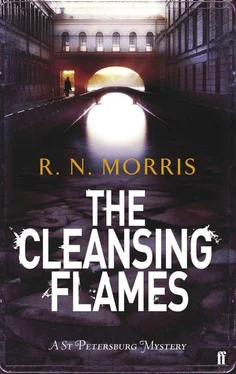R. Morris - The Cleansing Flames
Здесь есть возможность читать онлайн «R. Morris - The Cleansing Flames» весь текст электронной книги совершенно бесплатно (целиком полную версию без сокращений). В некоторых случаях можно слушать аудио, скачать через торрент в формате fb2 и присутствует краткое содержание. Год выпуска: 2011, ISBN: 2011, Издательство: Faber and Faber Fiction, Жанр: Исторический детектив, на английском языке. Описание произведения, (предисловие) а так же отзывы посетителей доступны на портале библиотеки ЛибКат.
- Название:The Cleansing Flames
- Автор:
- Издательство:Faber and Faber Fiction
- Жанр:
- Год:2011
- ISBN:0571259154
- Рейтинг книги:5 / 5. Голосов: 1
-
Избранное:Добавить в избранное
- Отзывы:
-
Ваша оценка:
- 100
- 1
- 2
- 3
- 4
- 5
The Cleansing Flames: краткое содержание, описание и аннотация
Предлагаем к чтению аннотацию, описание, краткое содержание или предисловие (зависит от того, что написал сам автор книги «The Cleansing Flames»). Если вы не нашли необходимую информацию о книге — напишите в комментариях, мы постараемся отыскать её.
The Cleansing Flames — читать онлайн бесплатно полную книгу (весь текст) целиком
Ниже представлен текст книги, разбитый по страницам. Система сохранения места последней прочитанной страницы, позволяет с удобством читать онлайн бесплатно книгу «The Cleansing Flames», без необходимости каждый раз заново искать на чём Вы остановились. Поставьте закладку, и сможете в любой момент перейти на страницу, на которой закончили чтение.
Интервал:
Закладка:
The most recent piece was one that Porfiry remembered reading. It was the attack on Virginsky’s former professor of jurisprudence, Tatiscev. It seemed that over the years K. had waged something of a campaign against this man, and was, as far as Porfiry could tell, the originator of the soubriquet ‘The Devil’s Professor.’
Porfiry now rearranged the clippings thematically. There were seven articles attacking Tatiscev, as well as five other articles which mercilessly lampooned another individual, one Vissarion Stepanovich Lebezyatnikov. This gentleman appeared to be a former professor of history, a liberal of a previous generation, whom K. deemed to be utterly without purpose or point. In short, he considered him to be a ‘superfluous man’ and called upon him to do the decent thing, which was — in K.’s opinion — simply to disappear.
Other individuals also served as targets for K.’s barbs, but none to the same extent as Tatiscev and Lebezyatnikov.
‘He seems to have a singular antipathy towards academic gentlemen.’ It was only after Porfiry had given voice to this musing that he realised there was no one there to hear it. Virginsky had not yet presented himself at the department. Porfiry consulted his fob watch. It was close to eleven.
Porfiry rose from his desk and peered outside his chambers to confer with his clerk. ‘Alexander Grigorevich, have you seen Pavel Pavlovich this morning?’
Zamyotov gave a minimal shake of the head, putting far more effort into producing a disdainful snort.
‘While I think of it, I need you to make an enquiry at the Address Office. The name is Vissarion Stepanovich Lebezyatnikov. A former professor of history. I require his address as soon as possible, if you please.’
Porfiry returned to his desk and read again the series of articles attacking Professor Tatiscev. The charges in each piece amounted to more or less the same complaint, continually restated: simply that the writer held the new law courts responsible for the decline in morality evident everywhere in society. Professor Tatiscev, as a noted supporter of the new courts, was held up as the human embodiment of all that was evil.
Of course, reasoned Porfiry, it would not do for the writer to attack the Tsar — at least not in these publications. The Tsar was above criticism. But the fact remained that it was the Tsar who had signed off the reform of the legal system. Tatiscev was outside the government, and, as far as Porfiry could tell, had never been in a position to influence the Tsar or his ministers. It was not even known if his opinion had been sought. The only charge that could be laid against him was that some of his former students had gone on to profit from the new system by becoming highly successful defence attorneys. What made him a natural target for these conservative papers was that he was a well-known radical, and also that he was an educator, with access to and influence over the younger generation. In other words, it was men like Tatiscev who were responsible for the gulf that had formed between fathers, who read publications like Russian Soil and Russian Era , and their sons, who preferred Affair .
Is that all there is to it? wondered Porfiry.
The political basis of the attacks was undoubtedly thin, perhaps deliberately so. If anything, Tatiscev came across as a straw man. Porfiry reminded himself that the writer of the articles was, under his real name, a radical journalist, who would undoubtedly have approved of Tatiscev’s political stance. If Kozodavlev wrote these pieces purely for money, as hackwork, he would be careful not to inflict serious damage on the cause in which he truly believed. And yet he might be willing to vilify a man he personally disliked, especially as he was doing so under the cloak of anonymity.
A cannonade of innuendo was fired off. Was it any wonder that our country was in crisis when a whole generation of jurists had sat at the feet of a man who had learnt his ethics from the serpent? The Devil’s Professor was not content to call for an end to the institution of marriage but had manfully taken it upon himself to bring it about, marriage by marriage. He was always ready with his own firm answer to the woman question. And just so that there should be no doubt what that answer was, it was asserted that Tatiscev had taken down the icon in his study and replaced it with a statue of Priapos.
To be frank, it was all rather juvenile, not to mention libellous. Beneath one of the articles, and seemingly linked to it, was a piece about the desecration of some icons in a church and the theft of relics and religious gems. In fact, there was no explicit connection made to Tatiscev, and indeed this piece appeared not to have been written by K.; nonetheless, the proximity of the articles associated the hapless professor with this crime too.
The four articles attacking Professor Lebezyatnikov were altogether different in tone, more light-hearted, entirely lacking in any scurrilous suggestions, but rather treating the former historian as a harmless buffoon. These lampoons could almost be said to be affectionate, celebrating rather than savaging their target. Porfiry was hard-pressed to see the point of the articles, as Professor Lebezyatnikov was now a retired gentleman, with practically no influence in society. If he might be described as ‘superfluous,’ what did that make the articles satirising him? Apparently, if K.’s satire was to be believed, he retained a high opinion of his importance, despite abundant evidence of his worthlessness. No doubt that made him ridiculous; it also made him somewhat pathetic. The attacks on him amounted to little more than a catalogue of the follies of a deluded old man.
It was past noon when Virginsky finally appeared. His face, drained of all colour, looked as though it had been slightly inflated, which had the effect of shrinking his eyes into narrow slits.
‘My God, Pavel Pavlovich, what has happened to you?’
‘I ran into someone.’
‘With your face?’
Virginsky squinted. ‘The sunlight is particularly bright today, do you not find?’
‘I do not find it especially so. Perhaps you would like to move your chair, so that you are not looking directly into the window. Would you care for some tea?’
Virginsky shook his head. ‘Are you not going to reprimand me?’ He winced, as if he felt Porfiry’s solicitude to be an intolerable cruelty.
‘I prefer not to. I imagine that your own conscience, the inevitable pangs of. . uh, remorse that you are suffering, will serve as both reprimand and warning. I will, however, express my concern, Pavel Pavlovich. Permit me to say that this is not like you. In all the years I have known you, I have observed you to be an admirably sober young man. To call you abstemious would not be overstating it. Therefore I consider this evident lapse to be out of character. I trust it does not presage the onset of a new habit and is rather the temporary influence of Yarilo, coupled with the accident of meeting an old friend.’
‘He was not an old friend.’
‘A new friend then?’
‘Why are you so interested in him? Am I not permitted to have a life outside the department, of which you are not a part?’
‘My dear, of course you are permitted! What an extraordinary thought! Let us put this behind us. In point of fact, I am secretly rather pleased that you have allowed yourself to relax to this extent. So long as it does not become a regular occurrence, I can only think that it will do you good to go on a binge once in a while.’
‘It was not a binge. I do not go on binges, Porfiry Petrovich. I. .’ But Virginsky broke off. A confessional flicker in his eyes was as close as he got to confiding in Porfiry.
‘I understand completely. It is because you are not used to indulging in alcoholic consumption at all that a small amount had such a deleterious effect on you. There are some taverns in Haymarket Square where one only has to breathe in the atmosphere and the room begins to spin.’
Читать дальшеИнтервал:
Закладка:
Похожие книги на «The Cleansing Flames»
Представляем Вашему вниманию похожие книги на «The Cleansing Flames» списком для выбора. Мы отобрали схожую по названию и смыслу литературу в надежде предоставить читателям больше вариантов отыскать новые, интересные, ещё непрочитанные произведения.
Обсуждение, отзывы о книге «The Cleansing Flames» и просто собственные мнения читателей. Оставьте ваши комментарии, напишите, что Вы думаете о произведении, его смысле или главных героях. Укажите что конкретно понравилось, а что нет, и почему Вы так считаете.












